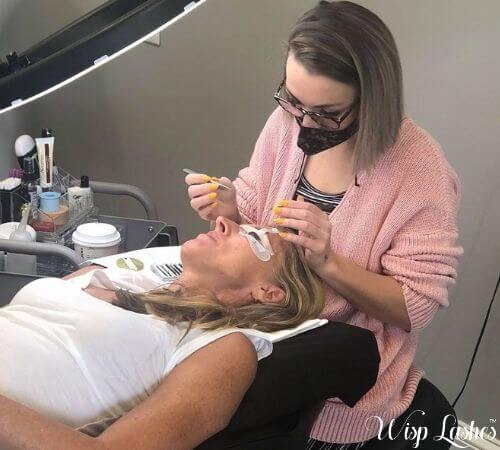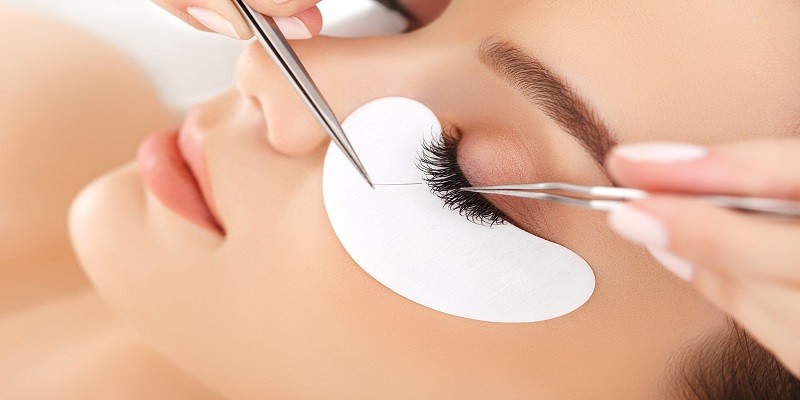Yes, it is possible to get your eyelashes done while pregnant. However, the risks and benefits should be carefully weighed before undergoing any type of beauty treatment during pregnancy. First and foremost, you should consult with your physician or midwife prior to getting any kind of cosmetic procedure while pregnant.
Lash extensions involve the use of adhesives that can potentially contain harsh chemicals which may be harmful to a developing fetus. Additionally, having lash extensions applied requires lying down on one’s back for an extended period of time which could impede proper blood flow circulation in certain areas and cause complications such as low-blood pressure induced dizziness or nausea. If you do decide to have lash extensions applied during pregnancy make sure the salon is using hypoallergenic adhesive products specifically formulated for sensitive skin and that they are regularly sterilizing their tools between each client to minimize risk exposure from bacteria or other contaminants found on brushes used in previous treatments.
- Speak to your doctor: Before getting eyelash extensions done while pregnant, it is important to speak with your doctor or healthcare provider about any safety concerns
- They will be able to advise if there are any potential risks associated with the procedure and provide guidance on what’s safe for you and your baby during pregnancy
- Choose a qualified technician: Make sure that whoever applies the lashes is experienced and knowledgeable in the process and that they use only high-quality products which have been clinically tested and approved as safe for use during pregnancy
- Ask questions about their qualifications, experience, hygiene standards etc
- , before booking an appointment 3
- Consider timing: Avoid having lash extensions applied too early in pregnancy when hormones can cause sensitivity in some women’s skin making them more prone to irritation from glues or other chemicals used during treatment
- It may be best to wait until after the first trimester has passed before making an appointment
- Arrive prepared : When going for a lash extension appointment make sure you arrive well rested, hydrated ,and ensure you bring along some snacks or drinks for yourself if needed
- This can help prevent dizziness which can sometimes occur due to lying down for long periods of time
Pregnancy and Eyelash Extensions Application
Is Eyelash Glue Safe During Pregnancy
Eyelash glue is generally considered safe to use during pregnancy, as long as you take proper precautions. It’s best to opt for a hypoallergenic adhesive and be careful not to get it into your eyes or mouth while applying. Additionally, make sure that the eyelash glue has had plenty of time to dry before sleeping on it in order to avoid any potential irritation.

Credit: www.wisplashes.com
How Should I Lay With My Eyelashes Done While Pregnant?
When pregnant, it is important to be mindful of how you lay down with eyelashes done. It is best to sleep on your back or sides, rather than on your stomach, as this can put pressure on the abdomen and cause discomfort. You should also avoid sleeping directly on top of the eye area because this could cause smudging and damage to the lashes.
Consider using a satin pillowcase which will help reduce friction between your face and bedding while still allowing air circulation throughout the night. If possible, use an extra cushion behind your neck for extra support if needed during sleep.
Can I Have Eyelashes While Pregnant?
Yes, you can have eyelashes while pregnant. However, it is important to check with your doctor before undergoing any type of cosmetic procedure. During pregnancy, hormones may cause some changes in the body that could affect the results of an eyelash treatment.
Additionally, certain ingredients used in lash treatments may be unsafe for use during pregnancy and could potentially harm both mother and baby. To ensure your safety during this special time, speak to a qualified medical practitioner about which products are safe for use during pregnancy.
Can You Have Eyelash Extensions When Giving Birth?
No, it is not recommended to have eyelash extensions when giving birth. Eyelash extensions are adhered with a semi-permanent adhesive and can be difficult to remove without damaging or pulling out the natural lash. During childbirth, your body will experience significant changes such as increased amounts of sweat and tear production which could weaken the bond between the extension and natural lash, leading to discomfort or worse – an allergic reaction.
Furthermore, during labor contractions you may rub your face more than usual which has even greater potential for damage to both your natural lashes as well as any existing extensions. For these reasons, it is best practice to avoid getting eyelash extensions prior to childbirth in order maintain a safe and comfortable delivery process for yourself.
Can I Get My Eyelashes Lifted While Pregnant?
The answer to this question is a definite no. Eyelash lifting, also known as lash perming or eyelash curling, involves the use of chemical solutions that can be potentially harmful to both mother and fetus. Even products labelled as “natural” may contain ingredients that could cause irritation or worse in pregnant women.
Additionally, because your body undergoes so many changes while pregnant, it’s not possible to predict how the chemicals used during an eyelash lift will react with your system; they may have unexpected effects on you and your baby. For these reasons, it is best to avoid any kind of cosmetic procedure while pregnant in order to stay safe and healthy.
Conclusion
Overall, getting eyelash extensions while pregnant can be done with caution and careful consideration of the product being used as well as the potential risks. It is important to consult a doctor or other medical professional before undergoing any beauty treatments during pregnancy. Although there are some risks associated with having eyelash extensions while pregnant, they can be minimized by using products that are safe for use on expectant mothers.
Ultimately, it is up to you and your doctor to decide if this treatment is right for you during your pregnancy journey.

